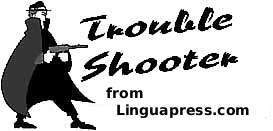|
|
| Linguapress.com | Advanced level reading resources | Intermediate reading resources | English grammar online | Puzzles and word games |
ENGLISH GRAMMAR POINTS - All or whole ?
| Linguapress for mobiles - home page | Online English grammar | Free advanced level resources | Free intermediate level resources |
 English
grammar
English
grammaron your mobile

|
The
tricky points of English grammar
Choosing
between all and whole
 All and whole are quantifiers, and as such they are a form of determiner. They express totality or completeness. Sometimes one can choose either of them; but there are major differences in their usage, and all and whole are not always interchangeable Meanings and usage of all and whole
AllAll implies a complete number or total entity. An incomplete number or entity can be expressed using the negative form of all, which is not all.1. All with singular nouns.There are two possible structures.1.1. The most common is {all + determiner + noun}. Determiners that can be used in this structure are the definite article the, demonstrative adjectives (this, that), possessive adjectives ( my, your, etc.), possessive forms of the noun (Peter's, the man's, etc.). When the group {all + determiner + noun} is the subject of a statement, the verb is normally in the singular. However, when the noun in the group is a collective noun referring to multiple people, such as team, committee, school, or family, the verb is normally in the plural (examples 3,4 and 5). Examples :
1.2. Less common {all + noun}This structure is much less common as it can only be used with non-count or uncountable nouns (such as water, oxygen, philosophy). The article must be omitted when the non-count noun is used as an open generalisation.Examples :
2. All with plural nounsPlural nouns are by definition count nouns, so the situation is less complicated. As in the singular, there are two structures, with or without a determiner., i.e. {all + determiner + noun} and{all + noun}Whether to use a determiner or not depends on the context, and follows exactly the normal rules for count nouns in the plural. It depends if the noun is being used as an open generalisation (no determiner), examples 1 - 5, or as a limited generalisation (with determiner), examples 6 - 10. Examples :
3. All with pronounsAll can either qualify a pronoun, or can be used as an indefinite pronoun.3.1. All qualifying a pronounAll can qualify plural pronouns, and can do so using two different structures.These are very different from the structures used with nouns. They are:
{pronoun (+ be)
+ all } and {all +
of + object pronoun} .
Note that all of
must be followed by an object pronoun (notably us, them). In this
it is used in the same way as each.
Generally speaking, either of the two structures is possible. Compare examples 1-6 with examples 8 - 13. Examples :
Additionally, all
can qualify the singular pronoun it,
using the same structures
Examples :
3.2. All as a pronounAll is sometimes used by itself, as an indefinite pronoun, meaning everything or everyone. This mostly occurs as the subject of a sentence, though very occasionally after a preposition.Examples :
5. All as an adverbOccasionally, all is used as an adverb, qualifying an adjective, with the meaning of completely (examples 1 & 2) , or qualifying a preposition such as through or over (examples 3 - 5).Examples :
|
|
| Linguapress
online CLEAR ENGLISH GRAMMAR |
| ► Click for Full Index |
| Selected grammar pages |
| Verbs |
| Verbs: the present tense |
| Verbs : the future |
| Verbs: conditional tenses |
| Phrasal & prepositional verbs |
| Irregular verb tables |
| Nouns |
| Noun phrases |
| Articles |
| Adjective order in English |
| The possessive |
| Sentences & clauses |
| Relative clauses in English |
| Conditional clauses in English |
| Word order in English |
| Reported questions in English |
| Miscellaneous |
| Language and style |
| Word stress in English |
| The short story of English |
| More resources |
| Reading resources: advanced |
| Reading resources: intermediate |
| Crosswords and word games |
Linguapress.com -
Free EFL reading resources